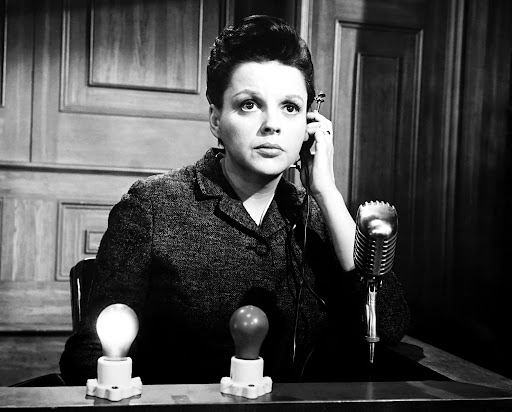Judgement at Nuremberg (1961)
You have probably never heard of Theodore Kaufman, an obscure American self-published author who wrote in the 1940s. Hell, even if you’d been living in America in the 1940s you almost certainly would never have heard of him. However, if you were a German living in the Third Reich during the war you would absolutely have known who he was, and would have believed him to be one of the most dangerous men alive.
In 1941 Kaufman self-published Germany Must Perish!, a bright little volume about how Germans are pure evil, just bad on the genetic level, and that the only way to ensure the peace of the world was to sterilise the entire nation and let them die out. Now, you might (I really hope you wouldn’t, but you might) argue that race-based genocide is fine if the other guy started it first, but that’s because you forgot about Goebbels.
 You forgot about Goebbels, you utter chump.
You forgot about Goebbels, you utter chump.Goebbels milked Kaufman’s little pamphlet for everything it was worth, using it to turbocharge Germany’s propaganda machine and convince ordinary Germans, even those who hated the regime, that the war was a literal battle for their survival as a people. Goebbels presented Kaufman as FDR’s Svengali, the intellectual driving force behind America’s war against Germany. When, in reality, he was the forties equivalent of the least unhinged political Tiktoker. Germany Must Perish! was such a gift to Goebbels that the American journalist Howard Smith remarked:
“No man has ever done so irresponsible a disservice to the cause his nation is fighting and suffering for than Nathan Kaufman.”
Which is why, even at the risk of friendly fire, it is so important to call out people on your own side of the aisle who are saying evil, crazy shit. Not just because it’s evil and crazy (though that should be enough reason) but because it’s tactically vital.
We can dismiss Kaufmann’s thesis out of hand, just as any racially essentialist argument should be dismissed out of hand, but that still leaves the questions:
Why Germany? Could it have happened anywhere and Germany just drew the short straw? Or was there something particular about Germany that made its local manifestation of fascism so uniquely malevolent? And if so, how much blame do ordinary Germans bear for the actions of the regime?
My, this is a fun one, isn’t it?
It’s not something that can ever be objectively proved. I’ll keep my own answers until the end of the review but they’re just, like everything else on this blog, my own opinion. Today’s movie grapples with those very questions. And it begins within a man arriving in the ruins of Nuremberg, as the ashes of the last war still cool, and a cold wind has begun to blow in from the East…

Judge Dan Haywood (Spencer Tracey) has been summoned to Nuremberg to serve on a military tribunal trying four German judges and prosecutors for their alleged crimes during the Nazi era. These four men are Emil Hahn, Werner Lampe, Friedrich Hofstetter and Ernst Janning (played by Burt Lancaster). Now you might be, as I was, under the impression that this movie is a dramatization of the famous International Military Tribunal held by the US, UK, France and the USSR between 1945 and 1946 where the top surviving Nazi and military leaders were tried. But, it’s actually a fictionalised version of the Judge’s Trial of 1947. This is a major theme of the movie. It’s been two years since the war ended, all of the really big-ticket Nazis (at least those who aren’t dead or in hiding) have been tried, jailed or hanged and now all that’s left is the relatively little fish. And the question hanging over everything is: what’s the point of all this? How far down the food chain are we willing to go in a country where everyone, essentially, could be argued to bear some responsibility? Public opinion in America has largely forgotten that the trials are even still going on and it really would be nice to have the Germans on our side when the USSR starts knocking on the door. So, again, what is the point of all this? Even Haywood himself is proof that enthusiasm for the whole enterprise is starting to wane. Back in America he’s not even a judge anymore, having lost election and as he tells his aide Byers (played by an impossibly young, impossibly charming William Shatner) he wasn’t the first choice for this job or even the tenth. He’s just the one who was willing to schlep all the way to Germany.
One man who isn’t ready to pack it all in is the prosecutor Colonel Tad Lawson, one of the soldiers who liberated Dachau and who is determined to see every last Nazi brought to justice for what he saw. On the opposite side is German lawyer Hans Rolfe who is defending all four of the accused. Rolfe is played by Maximillian Schell, who originated the part when it was televised as a play in 1959. Schell was one of the few actors to be retained from the original cast and you can absolutely see why, and why Schell got the Oscar for this performance.

Rolfe is the most interesting character in the story. A young, idealistic German who is appalled by the atrocities of the Nazis but despises what he sees as the hypocrisy of the Allies presenting the the Germans as uniquely wicked while glossing over their own atrocities, failings and collaboration with Hitler prior to the war. Rolfe idolises Janning, and hopes, no, needs to prove that Janning was a good man doing the best he could in an impossible situation. As Rolf says him himself, it is not simply Janning on trial but all of Germany.
But this desire to exonerate his nation leads Rolfe down an extremely dark path, as his cross-examination of the prosecution’s witnesses leads him to commit the same sins as the Nazi jurists who preceded him. He argues that a man sterilised for his political beliefs was actually sterilised for being mentally deficient (because that’s better?). He does occasionally land a palpable hit, when reading a tract calling for sterilisation of undesirables to ensure genetic health of the population, he notes wryly that it came not from the Third Reich but from the State of Virginia.
He crosses a terrible rubicon when the prosecution calls Irene Hoffman to the stand. Hoffman is wonderfully played by Judy Garland, in her first film following A Star is Born seven years previously, during which time she’d suffered immense, health, emotional and professional difficulties.
 Or, as Judy Garland called it, “a Tuesday”.
Or, as Judy Garland called it, “a Tuesday”.This role won her a second, and final Oscar nomination and it was well deserved.
As a teenager, Hoffman’s elderly neighbour, a Jew, was falsely accused of having raped her and was tried in Janning’s court. In a desperate attempt to prove that Hoffman was in fact raped and that Janning’s sentence was justified, Rolfe re-traumatises Hoffman, trying to force her to recant her testimony and accuse her neighbour, just as the Nazis did.
Finally, Janning is so disgusted by Rolfe’s actions that he addresses the court, and fully admits his culpability.
Lawson closes his case by showing the court actual, real-world footage of the scale of death and suffering in the death camps. I will not describe them.
As the three judges deliberate, the US military subtly pressures them for leniency as the Soviets have begun to roll down the iron curtain and the top brass want to start focusing on the next war rather than to continue litigating the last one.
But Haywood stands firm. All four defendants are sentenced to life in prison. After the trial, Rolfe visits Haywood and makes a prediction; not one of the defendants sentenced today will serve more than five years. Haywood sombrely agrees that that may be the logical choice, but not the right one.
Before leaving Germany, Haywood visits Janning in prison. Janning tells him that he has his respect but begs him to believe that he never knew what following the Nazis would lead to.
Haywood replies that he should have know the first time he sentenced an innocent man to death.
***
So. What do we think?
You have your own thoughts, I’m sure. Personally…I think the average German’s culpability is fairly low.
They didn’t know? I mean, sure, I don’t think it stretches credulity that a 65 year old hausfrau in Bremen wasn’t getting top level briefings on the inner workings of The Final Solution. I think very few people in the civilian population who knew the full scale of what was going on.
Ah but, they knew enough!
Sure. Enough to do what? Those quick to remind us that this was a regime that did not punish a single person for failing to shoot a jew should also remember that it was also a regime that guillotined a 21 year old woman over a leaflet. It is, perhaps, a touch disingenuous to suggest that resistance carried no risk.
Ah but they elected Hitler, didn’t they? No. He never won a majority of support in a free and fair election. And those that voted for him, well, how could they know how bad he would be? It wasn’t as if he had previously been elected, shown his true colours and then been voted back in with even greater support.
They supported him, though? Sure. After some stunning foreign policy victories and years of relentless, mind-numbing propaganda. Good thing propaganda doesn’t work on us.
But I don’t think it’s true either that Hitler could have happened anywhere. I don’t blame ordinary Germans for Hitler. But I do blame Germany.
Hitler was no great original thinker. Hitler was a sponge. There was nothing new about Hitler, nothing that was not already thick on the ground in the Germany of his youth. Eugenics, German nationalism, Scientific Racism, Misogyny, Anti-Semitism, Anti-Clericalism, the utter abhorrence of the Christian concept of morality, Houston Chamberlain, Nietzsche, Rosenberg, Wagner, deGobineau, he hoovered them up and filtered them through an obsessive resentment that could crush coal into diamond. But there was nothing new there.
He was a man utterly of his time and place.
He was Germany.
He was the country that made him. They always are.
Next Update: Man, if I had two cents for every time a review of a black and white courtroom drama starring Spencer Tracy turned into a long discursive historical essay, I’d have four cents. Not many, but it’s weird it happened twice. Anyway, I’m going to be spending Lent trying to make some progress on my next novel so I’ll meet you back here April 20th 2025
NEXT TIME: So in the sequel does Maui say “when you use a bird to write it’s called “x”ing?”

 newest »
newest »
 Incredibly thoughtful and insightful, even by your high standards. And of course, the delightful whiplash of following that with "Moana 2! Twitter joke!"
Incredibly thoughtful and insightful, even by your high standards. And of course, the delightful whiplash of following that with "Moana 2! Twitter joke!"



